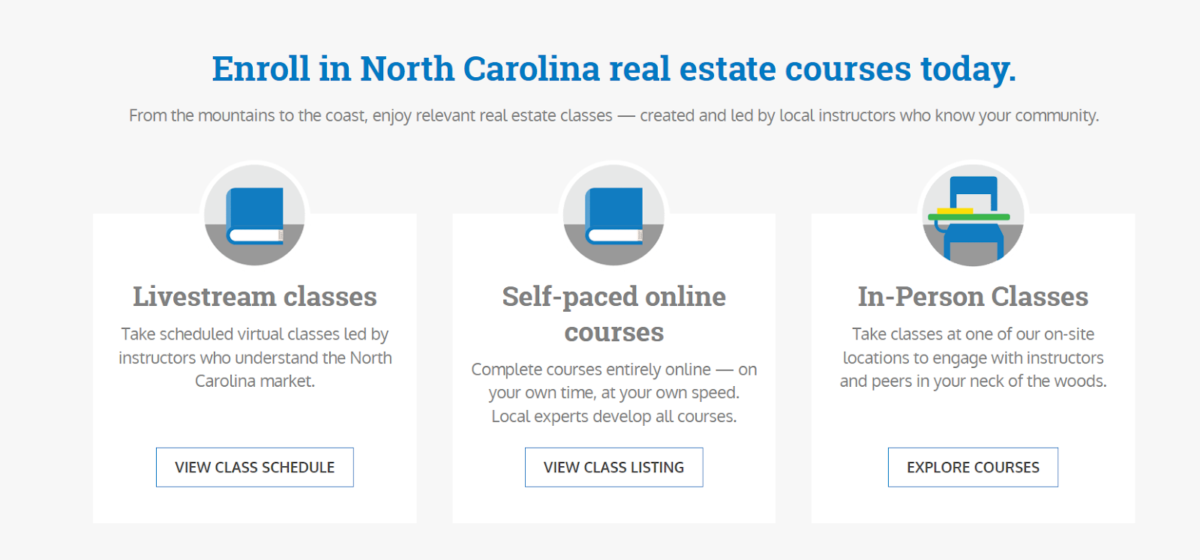If you’re ready to launch your real estate career in the Old North state, you’ve come to the right place. This step-by-step guide summarizes how to get your North Carolina real estate license, from understanding the basic requirements for applying to launching your career on the right foot. Here’s a quick summary, followed by a general overview of how to proceed with each step.









Step 1: Understand the North Carolina real estate license requirements.
To be eligible for a North Carolina real estate license, you need to:
- Be at least 18 years old
- Be a US citizen or have legal working status in the US
- Have a Social Security number
- Possess a high school diploma or GED
- Satisfy the commission that you possess good character
Types of licensees in North Carolina & how much they earn
- Provisional Broker (Average salary range via ZipRecruiter: $40,000 to $60,000): A newly licensed agent who has completed the 75-hour prelicensing course but has not fulfilled the required 90-hour post-licensing education.
- Broker (Average salary range via ZipRecruiter: $50,000 to $90,000): An agent who has completed the required 90-hour post-licensing education and is not on provisional status.
- Broker-in-charge (Average salary range via ZipRecruiter: $30,000 to $90,000+): A broker-in-charge supervises other brokers in the office and is responsible for overseeing transactions and legal compliance.
Step 2: Choose an NC real estate school for prelicensing education.
-
Cost: $500 to $1,100
-
Time commitment: 5 to 8 weeks
-
Helpful resource: Best Real Estate Schools in North Carolina
Note: The real estate license application requires certification that you’ve completed the prelicensing requirement. Your course completion is valid for 3 years.
One popular option is Colibri Real Estate, known for its flexible online courses that allow you to learn at your own pace. With interactive resources and real-world examples, it’s perfect for busy schedules. Plus, it’s approved by the North Carolina Real Estate Commission (NCREC), so you know you’re on the right track from the start!
Use our code “TheClose50” to get 50% off!

Step 3: Apply for a North Carolina real estate license.
-
Cost: $100
-
Time commitment: 30 to 60 minutes
-
Helpful resource: Apply for an NC Real Estate License
Once you’ve completed your 75 hours of prelicensing education, it’s time to apply for your North Carolina real estate license! The process is pretty straightforward, and you can do it all online through the NCREC website. You’ll need to submit a few important items to get started.
- Proof of completion of 75-hour prelicensing education
- Criminal background check report
- Personal identification (driver’s license, passport, etc.)
- Social Security number or Tax ID number
- Any additional information related to criminal history or prior licensing (if applicable)
There’s a non-refundable application fee of $100. Payment can be made via credit or debit card, and the whole process is much quicker if you opt for the online application.
Once you’ve submitted everything, the NCREC will process your application, which typically takes around 5-7 business days. If everything is clear, you’ll be sent a “Notice of Exam Eligibility,” allowing you to schedule the licensing exam.
Be sure to double-check that all documents are complete and accurate before submitting. This will help avoid delays in processing your application.
Step 4: Pass a background check.
-
Cost: $15 to $90 per location
-
Time commitment: 2 to 7 business days
-
Helpful resource: NC Criminal Records Check FAQs
All applicants must submit a criminal background check for North Carolina real estate license eligibility. You will be asked to “Apply for a Background Check” during the application process. Here are the details:
- From the application portal, select “Apply for Background Check.”
- Additional fees will be added to your application.
- Once the report is complete, the reporting agency will email a copy to you for your personal records.
- An additional copy will be submitted to NCREC and attached to your application.
- Once this is completed, you can finalize your application.
Note: The report must be received by the NCREC within six months of the application date.
Step 5: Pass the North Carolina real estate license exam.
-
Cost: $60
-
Time commitment: 4 hours
-
Helpful resource: How To Pass the Real Estate Exam: Top Tips for Success
| Test format and number of questions | Multiple choice format and 140 total questions |
| Where to register for the exam | Pearson VUE |
| Items to bring to testing center |
|
| Passing grade | 70% |
If you pass the exam, congratulations! You can move on to the next step.
If you don’t pass one or both sections, you’ll need to wait at least 10 days before trying again.
- If you only pass one section and need to retake just the one, you’ll have to again pay the $100 application fee, plus a $50 single section exam fee.
- If you haven’t passed both sections within 180 days, you’ll have to start over, which means paying the $100 application fee and the $60 exam fee again.
The good news is that if you don’t pass, you’ll receive a diagnostic report highlighting your strengths and areas that need improvement. This way, you can focus on studying the specific portion — whether it’s the national or state section — before retaking the exam.
Maximize your chances of passing the exam on the first try by using exam prep materials, like our free real estate practice exam. Practice tests and study guides will help you focus on key areas, giving you a feel for the types of questions you’ll encounter. Using these tools will boost your confidence and ensure you’re well-prepared when exam day arrives.
Step 6: Finalize your application & join a brokerage.
After passing the North Carolina real estate exam, you’ll need to finalize everything with the NCREC. This involves the commission reviewing your character and qualifications to approve your license officially. Once that’s done, you should receive your license certificate within 10 days.
In North Carolina, every new agent is required to work under a broker-in-charge before they can practice real estate. This is where you’ll get hands-on experience, mentorship, and support as you start your career.
Take your time to research different brokerages to find one that aligns with your goals, offers good training programs, and has a positive reputation. Once you’ve found the right fit, your broker will help activate your license with the North Carolina Real Estate Commission.
Check out The Close’s guide on how to choose a brokerage for help with evaluating brokers, or jump into our roundup of the best real estate companies to work for.
Step 7: Start a successful career in North Carolina.
You’ve got your license, so now it’s time to hit the ground running and build a thriving real estate career! Here are some tips to help you kick off your journey as a successful agent in North Carolina:
Frequently asked questions (FAQs)
How long does it take to get a real estate license in NC?
It typically takes about 3 to 6 months to get your North Carolina real estate license, depending on how quickly you complete your 75-hour prelicensing course and pass the exam. If you’re hustling, you might finish sooner!
How much does it cost to get a real estate license in North Carolina?
A realtor license in NC carries a total cost of around $700. This includes your prelicensing course, the $100 application fee, the $60 exam fee, and any additional costs, like background checks. After you pass the exam and affiliate with a firm, there will be additional fees, such as joining fees for the brokerage and MLS, which you should also be prepared to pay.
How hard is the NC real estate exam?
Yes, the NC real estate exam can be challenging. In fact, data from the NCREC1 shows that the pass rate is around 60% to 70% for first-time takers, depending on the education provider. That shows that with the right preparation, you have a good chance to pass! The exam covers both national and state-specific real estate topics, so use practice exams to feel confident going in.
Back to you
Now that you know the steps to get your North Carolina real estate license, it’s time to take the leap! The opportunities are endless. So, are you ready to begin your journey?
Share your own experiences — The Close is here to help you every step of the way!













Add comment